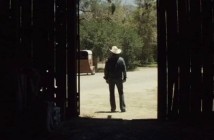The Zero Theorem (2013)
Cast: Christoph Waltz, Lucas Hedges, Mélanie Thierry
Director: Terry Gilliam
Country: UK | Romania | France | USA
Genre: Drama | Fantasy | Sci-Fi
Editor’s Notes: The Zero Theorem opens in limited release Friday, September 19, 2014.
There are directors who convey their stylistic vision to the screen with such single-mindedness that as a viewer you are almost predisposed to like or dislike the finished film prior to actually experiencing it; the key element being experience. Terry Gilliam is one such filmmaker, a creative force of such striking aesthetic abundance that his films are as impressive for their on screen visuals as they are at times confusing in their subject matter.
For such a bold and expansively ambitious production The Zero Theorem is formatted very much like a play for its middle and final acts.

Dystopian worlds are familiar territory for Gilliam (Brazil in 1984 and 12 Monkeys in 1994 for example) and for The Zero Theorem he has returned to a near-future of his own making, although this time it is a social media hell infested by a garishly coloured populous evolving in virtuality rather than reality. Cutting a grey path through this intensely pressurised world is Qohen Leth (a bald headed Christoph Waltz) who slaves away each day at a work station for the all consuming Mancorp. Harassed by his supervisor Joby (David Thewlis) he spends his evenings in isolation, awaiting the call which he believes will explain his existence. After being hand-picked by the mysterious Management he is relocated to work from home on the mystical Zero Theorem with passing assistance from teenage programmer Bob (Lucas Hedges) and online escort girl Bainsley (Melanie Thierry) who may or may not have sincere motives.
For such a bold and expansively ambitious production The Zero Theorem is formatted very much like a play for its middle and final acts. After Leth is granted his wish of working from home, albeit with the impossible task of providing proof beyond his understanding, the majority of the story takes place in his beautifully set-designed, pigeon-infested former church. Despite the self enforced minimalist lifestyle and infrequent visits from Bob and Bainsley, sandwiched between comedic turns from Tilda Swinton as an online psychotherapist, Leth begins to develop his until-then repressed personality. He slowly begins to drop the habitual references to himself in the plural and gradually learns to interact with other humans while sporadically enjoying occasional simple moments in life. The fact that even though the true plot is baffling even in Gilliam terms matters not as you begin to relate to this strangely engaging everyman despite the nagging suspicion that there will be little in the way of true redemption for him come the finale.
As with the majority of Gilliam’s back catalogue though the true joy is in the absurdly intoxicating performances he draws from his assembled cast.
As with the majority of Gilliam’s back catalogue though the true joy is in the absurdly intoxicating performances he draws from his assembled cast. Waltz is blandly understated as the misguided lead around which the rest orbit and Thewlis is in strong form, seemingly channelling the spirit of the Python’s in every scene. It is Thierry’s damaged fantasy girl and Hedges’ unreadable cohort that really stand out though, offering both encouragement and bleak realism to Leth’s obsession with learning the truth of existence with their expositions left to the audience to interpret as wisdom or warning.
Love it or loathe it, and there seems to be little middle ground with The Zero Theorem, there is no doubt it is as brave and ambitious as anything Gilliam has produced before. It may not have the impact of Brazil, the paranoia of 12 Monkeys or the sparklingly dark wit of The Fisher King but it still manages to encapsulate much of the director’s own personality. There is enough thematic social comment and background humour to warrant repeat viewings, just don’t expect to fully understand the whole of the films vision. In the undeniable truth that provides the backbone for Terry Gilliam’s work, it is up to the audience to draw their own conclusions. To that end, The Zero Theorem is truly a film that gives back to its audience as much as you bring to it.
Love it or loathe it, and there seems to be little middle ground with The Zero Theorem, there is no doubt it is as brave and ambitious as anything Gilliam has produced before. It may not have the impact of Brazil, the paranoia of 12 Monkeys or the sparklingly dark wit of The Fisher King but it still manages to encapsulate much of the director’s own personality.




